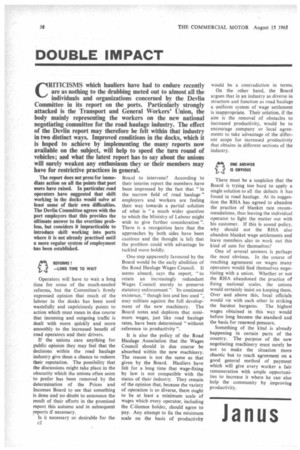DOUBLE IMPACT
Page 60

If you've noticed an error in this article please click here to report it so we can fix it.
CRITICISMS which hauliers have had to endure recently are as nothing to the drubbing meted out to almost all the individuals and organizations concerned by the Devlin Committee in its report on the ports. Particularly strongly attacked is the Transport and General Workers' Union, the body mainly representing the workers on the new national negotiating committee for the road haulage industry. The effect of the Devlin report may therefore be felt within that industry in two distinct ways. Improved conditions in the docks, which it is hoped to achieve by implementing the many reports now available on the subject, will help to speed the turn round of vehicles; and what the latest report has to say about the unions will surely weaken any enthusiasm they or their members may have for restrictive practices in general.
The report does not press for immediate action on all the points that port users have raised. In particular road operators have suggested that shift working in the docks would solve at least some of their own difficulties. The Devlin Committee agrees with the port employers that this provides the ultimate answer to the overtime problem, but considers it impracticable to introduce shift working into ports where it is not already practised until a more regular system of employment has been established. n
REFORMS?
—LONG TIME TO WAIT
Operators will have to wait a long time for some of the much-needed reforms, but the Committee's firmly expressed opinion that much of the labour in the docks has been used wastefully and capriciously points to action which must mean in due course that incoming and outgoing traffic is dealt with more quickly and more smoothly to the increased benefit of road operators and their drivers.
If the unions care anything for public opinion they may feel that the decisions within the road haulage industry give them a chance to redeem their reputation. The possibility that the discussions might take place in the obscurity which the unions often seem to prefer has been removed by the determination of the Prices and Incomes Board to see that something is done and no doubt to announce the result of their efforts in the promised report this autumn and in subsequent reports if necessary.
Is it necessary or desirable for the c2 Board to intervene? According to their interim report the members have been impressed by the fact that "in the narrow field of road haulage" employers and workers are feeling their way towards a partial solution of what is "a much wider question to which the Ministry of Labour might wish to give further consideration ". There is a recognition here that the approaches by both sides have been cautious and the thought is left that the problem could with advantage be tackled more boldly.
One step apparently favoured by the Board would be the early abolition of the Road Haulage Wages Council. It seems absurd, says the report, "to retain an increasingly redundant Wages Council merely to preserve statutory enforcement ". Its continued existence, "though less and less used ", may militate against the full development of the new machinery. The Board notes and deplores that minimum wages, just like road haulage rates, have been determined "without reference to productivity ".
It is also the policy of the Road Haulage Association that the Wages Council should in due course be absorbed within the new machinery. The reason is not the same as that given by the Board. Hauliers have felt for a long time that wage-fixing by law is not compatible with the status of their industry. They remain of the opinion that, because the variety of operation is so diverse, there ought to be at least a minimum scale of wages which every operator, including the C-licence holder, should agree to pay. Any attempt to fix the minimum scale on the basis of productivity would be a contradiction in terms.
On the other hand, the Board argues that in an industry as diverse in structure and function as road haulage a uniform system of wage settlement is inappropriate. Their solution, if the aim is the removal of obstacles to increased productivity, would be to encourage company or local agreements to take advantage of the different scope for increased productivity that obtains in different sections of the industry.
ONE ANSWER IS OBVIOUS
There must be a suspicion that the Board is trying too hard to apply a single solution to all the defects it has found in road haulage. At its suggestion the RBA has agreed to abandon the practice of blanket rate recommendations, thus leaving the individual operator to fight the matter out with his customer. If this is sound policy. why should not the RHA also abandon blanket wage settlements and leave members also to work out this kind of sum for themselves?
One of several answers is perhaps the most obvious. In the course of reaching agreement on wages many operators would find themselves negotiating with a union. Whether or not the RHA abandoned the practice of fixing national scales, the unions would certainly insist on keeping them. Over and above this, local officials would vie with each other in striking the hardest bargains. The highest wages obtained in this way would before long become the standard and the basis for renewed pressure.
Something of the kind is already happening in certain parts of the country. The purpose of the new negotiating machinery must surely be not to make the situation more chaotic but to reach agreement on a good general method of payment which will give every worker a fair remuneration with ample opportunities to increase it where he can also help the community by improving productivity.
Janus




























































































































